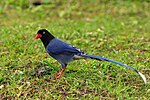The Bunun (Bunun: Bunun), also historically known as the Vonum, are a Taiwanese indigenous people. They speak the Bunun language. Unlike other aboriginal...
17 KB (2,238 words) - 17:48, 23 July 2024
The Bunun language (Chinese: 布農語) is spoken by the Bunun people of Taiwan. It is one of the Formosan languages, a geographic group of Austronesian languages...
20 KB (1,893 words) - 13:24, 24 June 2024
Look up Bunun in Wiktionary, the free dictionary. Bunun can refer to: the Bunun people of Taiwan the Bunun language, their Austronesian language This disambiguation...
283 bytes (54 words) - 10:27, 16 March 2024
Takasago people (高砂族, Takasago-zoku). The latter group included the Atayal, Bunun, Tsou, Saisiat, Paiwan, Puyuma, and Amis peoples. The Tao (Yami) and Rukai...
192 KB (23,085 words) - 12:08, 29 October 2024
traditional taboos of Taiwanese aborigines. Bunun people call black bears Aguman or Duman, which means the devil. If a Bunun hunter's trap accidentally traps a...
15 KB (1,660 words) - 07:39, 17 October 2024
The Bunun Cultural Museum (traditional Chinese: 布農族文化館; simplified Chinese: 布农族文化馆; pinyin: Bùnóng Zú Wénwùguǎn) is a museum about Bunun people in Haiduan...
3 KB (185 words) - 09:29, 1 June 2022
Savungaz Valincinan (redirect from Lee I want to exclusively list my tribal name, my Bunun tribal name is Savungaz Valincinan)
Lǐ Pǐnhán) prior to exclusively using her Bunun name. Her Bunun-language name is Savungaz Valincinan; Bunun uses the Latin script. It is transliterated...
26 KB (2,249 words) - 17:28, 5 September 2024
In the culture of the Bunun of Taiwan, a hanitu or qanitu is a spirit. The concept does not exactly equate with similar myths from other cultures. The...
5 KB (647 words) - 10:55, 5 July 2023
The Bunun Leisure Farm or Bunun Tribal Leisure Farm (traditional Chinese: 布農部落休閒農場; simplified Chinese: 布农部落休闲农场; pinyin: Bùnóng Bùluò Xiūxián Nóngchǎng)...
3 KB (190 words) - 00:39, 29 November 2021
Taiwan blue magpie (category Articles containing Bunun-language text)
Tsou, Thao, and Bunun peoples. The sacred bird is called Teofsi'za in Tsou, Fitfit in Thao, and Haipis (Isbukun group) / Kaipis in Bunun. In the common...
16 KB (1,724 words) - 16:23, 19 September 2024







